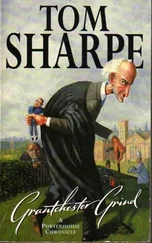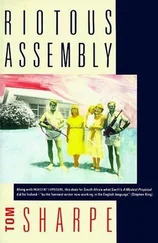Tom Sharpe - Porterhouse Blue
Здесь есть возможность читать онлайн «Tom Sharpe - Porterhouse Blue» весь текст электронной книги совершенно бесплатно (целиком полную версию без сокращений). В некоторых случаях можно слушать аудио, скачать через торрент в формате fb2 и присутствует краткое содержание. Жанр: Современная проза, на английском языке. Описание произведения, (предисловие) а так же отзывы посетителей доступны на портале библиотеки ЛибКат.
- Название:Porterhouse Blue
- Автор:
- Жанр:
- Год:неизвестен
- ISBN:нет данных
- Рейтинг книги:4 / 5. Голосов: 1
-
Избранное:Добавить в избранное
- Отзывы:
-
Ваша оценка:
- 80
- 1
- 2
- 3
- 4
- 5
Porterhouse Blue: краткое содержание, описание и аннотация
Предлагаем к чтению аннотацию, описание, краткое содержание или предисловие (зависит от того, что написал сам автор книги «Porterhouse Blue»). Если вы не нашли необходимую информацию о книге — напишите в комментариях, мы постараемся отыскать её.
Porterhouse Blue — читать онлайн бесплатно полную книгу (весь текст) целиком
Ниже представлен текст книги, разбитый по страницам. Система сохранения места последней прочитанной страницы, позволяет с удобством читать онлайн бесплатно книгу «Porterhouse Blue», без необходимости каждый раз заново искать на чём Вы остановились. Поставьте закладку, и сможете в любой момент перейти на страницу, на которой закончили чтение.
Интервал:
Закладка:
“Difficult to eat an entire ox at one sitting,” said the Bursar. “One suspects our predecessors had, shall we say, grosser appetites.”
“I always said it was a mistake to make him Prime Minister,” said the Chaplain.
The Senior Tutor took his place, at table. He was looking more than usually austere.
“Talking of gross appetites,” he said grimly, “I have the gravest doubts about some of our younger members. I have just had a visit from a young man who claims to be under some compulsion to sleep with his bedder.” He helped himself to horseradish.
The Bursar sniggered. “Which one?” he asked.
“Zipser,” said the Senior Tutor.
“Which bedder?”
“I didn’t enquire,” said the Senior Tutor. “It didn’t seem a particularly relevant question.”
The Bursar considered the problem.
“Isn’t he in the Tower?” he asked the Dean.
“Who?”
“Zipser.”
“Yes. I think he is,” said the Dean.
“Then it must be Mrs Biggs.”
The Senior Tutor, who had been debating what to do with a long piece of gristle, swallowed it.
“Dear me. Mrs Biggs. I must say I did young Zipser an injustice.” he said with alarm.
“Impossible to do an injustice to anyone with such depraved tastes,” said the Dean firmly.
“Mrs Biggs hardly comes within the category of forbidden fruit,” tittered the Bursar.
“Thank you,” answered the Chaplain, “I think I will have an apple.”
“Mrs Biggs,” muttered the Tutor. “No wonder the poor fellow imagined he was going mad.”
“Not really,” said the Chaplain. “This one is all right at any rate.”
“What advice did you give him?” the Bursar asked.
The Senior Tutor looked at him disbelievingly. “Advice?” he asked. “It is hardly my position to offer advice on such questions. I am the Senior Tutor, not a Marriage Guidance Counsellor. As a matter of fact I advised him to see the Chaplain.”
“It’s a noble calling,” said the Chaplain, helping himself to a pear. The Senior Tutor sighed and finished his cold beef.
“It only goes to show what happens when you open the doors of the College to research graduates. In the old days such a thing would have been unheard of,” said the Dean.
“Unheard of perhaps but not I think unknown,” said the Bursar.
“With bedders?” the Dean asked angrily. “With bedders ? Maintain some sense of proportion, I beg you.”
“No thank you, Dean. I’ve had quite enough already,” the Chaplain replied.
The Dean was about to say something about old fools when the Senior Tutor intervened. “In the case of Mrs Biggs,” he said, “it is precisely the question of proportion that is at stake.”
“We had that last night,” said the Chaplain.
“Oh for God’s sake,” the Senior Tutor snarled. “How the hell can one conduct a serious discussion with him around.”
“My dear fellow,” the Praelector sighed, “that is a question that has been bothering me for years.”
They finished the meal in silence, each occupied with his own thoughts. It was only when they were assembled in the Combination Room for coffee and the Chaplain had been persuaded to go to his room to write a note inviting Zipser to tea that the discussion began again.
“I think that we should view this matter in the wider context,” the Dean said. “The Master’s speech last night indicated only too clearly that he has in mind an extension of precisely that permissiveness of which this latest incident is indicative. I understand. Bursar, that you had a tête-à-tête with Sir Godber this morning.”
The Bursar looked at him unpleasantly. “The Master phoned to ask me to discuss the College finances with him,” he said. “I think you might give me credit for having done my best to disabuse him of the changes his speech suggested.”
“You explained that our resources do not allow us to indulge in the liberal extravagances of King’s or Trinity?” the Senior Tutor asked. The Bursar nodded.
“And was the Master satisfied?” the Dean asked.
“Stunned, I think, would be the more accurate description of his reaction,” said the Bursar.
“Then we are all agreed that whatever he suggests at the meeting of the College Council tomorrow we shall oppose on principle,” said the Dean.
“I think it would be best to wait to hear what he proposes before deciding on a definite policy,” the Praelector said.
The Senior Tutor nodded. “We must not appear too inflexible. An appearance of open-mindedness has in my experience a tendency to disarm the radical left. They seem to feel the need to reciprocate. I’ve often wondered why but it has worked to keep the country on the right lines for years.”
“Unfortunately this time we are dealing with a politician,” the Dean objected. “I have a shrewd idea the Master is rather more experienced in these affairs than we give him credit for. I still think an undivided front is the best policy.”
They finished their coffee and went about their business. The Senior Tutor went down to the Boathouse to coach the first boat, the Dean slept until teatime, and the Bursar spent the afternoon doodling in his office wondering if he had been wise to tell Sir Godber about the endowment subscriptions. There had been a strength of feeling in the Master’s reaction that had surprised the Bursar and had made him wonder if he had gone too far. Perhaps he had misjudged Sir Godber and the vehemence of his ideals.
Chapter 5
Skullion cycled out along the Barton Road towards Coft. His bowler hat set squarely on his head, his cycle clips and his black overcoat buttoned against the cold gave him an intransigently episcopalian air in the snow-covered landscape. He cycled slowly but relentlessly, his thoughts as dark as his habit and as bitter as the wind blowing unchecked from the Urals. The few bungalows he passed looked insubstantial beside him, transient and rootless in contrast to the black figure on the bicycle in whose head centuries of endured servitude had bred a fierce bigotry nothing would easily remove. Independence he called it, this hatred for change whether for better or worse. In Skullion’s view there was no such thing as change for the better. That came under the heading of improvement. He was prepared to give his qualified approval to improvements provided there was no suggestion that it was the past that had been improved upon. That was clearly out of the question and if at the back of his mind he recognized the illogicality of his own argument, he refused to admit it even to himself. It was one of the mysteries of life which he accepted as unquestioningly as he did the great metal spiders’ webs strung out across the fields beside the road to catch the radio evidence of stars that had long since ceased to exist. The world of Skullion’s imagination was as remote as those stars but it was enough for him that, like the radio telescopes, he was able to catch echoes of it in men like General the Honourable Sir Cathcart D’Eath, KCMG, DSO.
The General had influence in high places and Royalty came to stay at Coft Castle. Skullion had once seen a queen mother dawdling majestically in the garden and had heard royal laughter from the stables. The General could put in a good word for him and more importantly a bad one for the new Master and, as an undergraduate, the then just Hon Cathcart D’Eath had been one of Skullion’s Scholars.
Skullion never forgot his Scholars and there was little doubt that though they might have liked to, none of them forgot him. They owed him too much. It had been Skullion who had arranged the transactions and had acted as intermediary. On the one hand idle but influential undergraduates like the Hon Cathcart and on the other impecunious research graduates eking out a living giving supervision and grateful for the baksheesh Skullion brought their way. The weekly essay regularly handed in and startlingly original for undergraduates so apparently ill-informed. Two pounds a week for an essay had served to subsidize some very important research. More than one doctorate owed everything to those two pounds. And finally Tripos by proxy, with Skullion’s Scholars lounging in a King Street pub while in the Examination School their substitutes wrote answers to the questions with a mediocrity that was unexceptional. Skullion had been careful, very careful. Only one or two a year and in subjects so popular that there would be no noticing an unfamiliar face in the hundreds writing the exams. And it had worked. “No one will be any the wiser,” he had assured the graduate substitutes to allay their fears before slipping five hundred, once a thousand, pounds into their pockets. And no one had been any the wiser. Certainly the Honourable Cathcart D’Eath had gone down with a two two in History with his ignorance of Disraeli’s influence on the Conservative Party unimpaired in spite of having to all appearances written four pages on the subject. But what he had gained on the roundabout he had also gained on the swings and the study of horseflesh he had undertaken during those three years at Newmarket served him well in the future. His use of cavalry in the Burmese jungle had unnerved the Japanese by its unadulterated lunacy and, combined with his name, had suggested a kamikaze element in the British army they had never suspected. Sir Cathcart had emerged from the campaign with twelve men and a reputation so scathed that he had been promoted to General to prevent the destruction of the entire army and the loss of India. Early retirement and his wartime experience of getting horses to attempt the impossible had encouraged Sir Cathcart to return to his first love and to take up training. His stables at Coft were world-famous. With what appeared to be a magical touch but owed in fact much to Skullion’s gift for substitution. Sir Cathcart could transform a broken-winded nag into a winning two-year-old and had prospered accordingly. Coft Castle, standing in spacious grounds, was surrounded by a high wall to guard against intruding eyes and cameras and by an ornate garden in a remote corner of which was a small canning factory where the by-products of the General’s stables were given discreet anonymity in Cathcart’s Tinned Catfood. Skullion dismounted at the gate and knocked on the lodge door. A Japanese gardener, a prisoner of war, whom Sir Cathcart kept carefully ignorant of world news and who was, thanks to the language barrier, incapable of learning it for himself, opened the gate for him and Skullion cycled on down the drive to the house.
Читать дальшеИнтервал:
Закладка:
Похожие книги на «Porterhouse Blue»
Представляем Вашему вниманию похожие книги на «Porterhouse Blue» списком для выбора. Мы отобрали схожую по названию и смыслу литературу в надежде предоставить читателям больше вариантов отыскать новые, интересные, ещё непрочитанные произведения.
Обсуждение, отзывы о книге «Porterhouse Blue» и просто собственные мнения читателей. Оставьте ваши комментарии, напишите, что Вы думаете о произведении, его смысле или главных героях. Укажите что конкретно понравилось, а что нет, и почему Вы так считаете.












